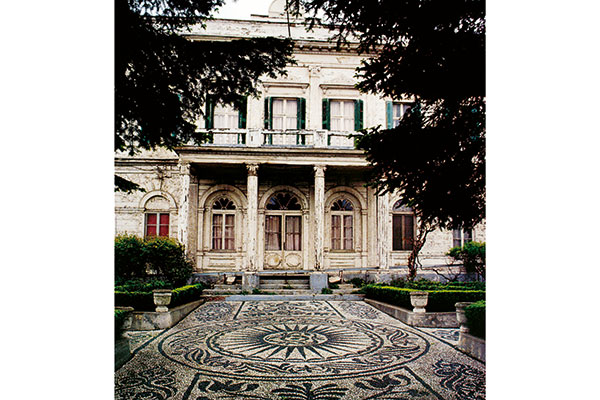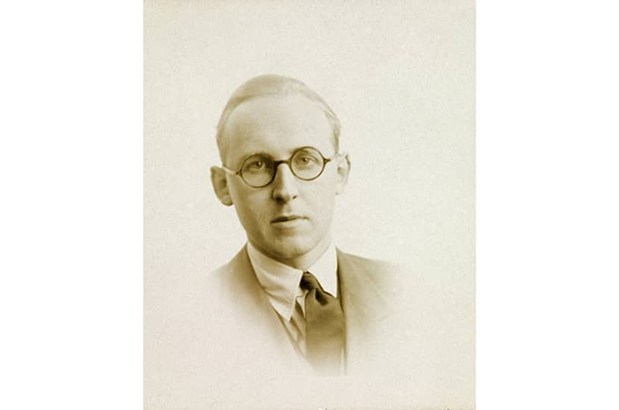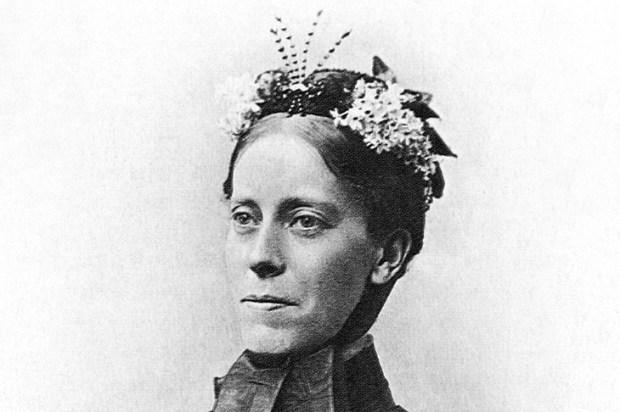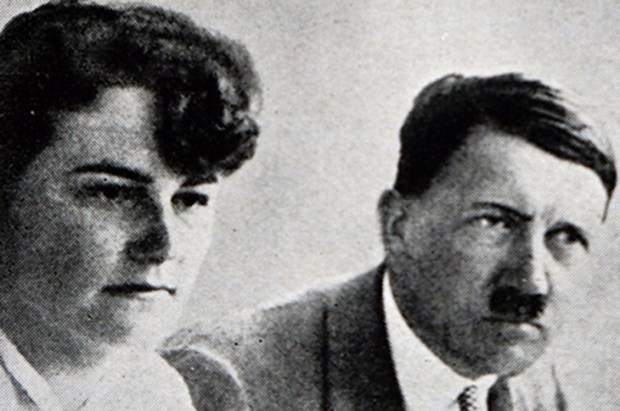The novelist Mary Wesley never forgot the night of 26 October 1944. She was then 32, locked in a loveless marriage to ‘a perfectly nice but remarkably boring’ barrister, Lord Swinfen, and was dining at the Ritz with a friend from MI6 — she had worked there in April 1940, decoding the positions of German regiments — when she looked up and saw, seated at another table, the Royal Marines captain whom she had met only a few hours earlier at Les Ambassadeurs. ‘He kept sending me notes through dinner saying, “You can’t stay with that old bore. Come dancing.”’ Which she did.
After he had escorted her back through the bomb-blasted streets to the Rembrandt Hotel, she woke early — ‘because I knew it was something big and I’d just sworn to give up men’. The man rose earlier still, at 5am. ‘He’d spent the whole night ringing round London to ask who I was. I found myself in the lobby checking out, desperate to get away — when there he was, beside me.’
She told me: ‘He stayed there for the rest of his life.’
Eric Siepmann, 41, was a tall, impetuous Old Wykehamist who at school had beaten Richard Crossman for not cleaning his white shoes. At Oxford, to which he had won a scholarship as well, he provoked Evelyn Waugh to splutter: ‘Do I like Eric Siepmann? That’s an occupation as fatuous as balancing a pole on your chin.’ The novelist Antonia White, with whom he’d had an affair, called him ‘the wickedest man I ever met’.
The bi-polar third son of a brilliant German émigré teacher, Siepmann was a talented if volatile journalist who had a destructive habit of walking out of jobs because he refused to compromise. His personal life was no less self-sabotaging. He had been married twice: once to an actress who had bolted, and, at the time of meeting Mary, to a woman he hardly knew called Phyllis. Her chief interest in Siepmann had been the widow’s pension that she stood to receive if he was shot dead, as was likely, in Crete. In the event, he was sent to Cairo, and survived. Following a blazing row in Egypt with Phyllis — ‘she lived with him three weeks and that was that’ — they had not seen each other for two years. Phyllis was to return to the frame.
As Siepmann warned Mary after they spent the day together in bed and then the next afternoon ‘in a large bath, talking’: ‘Life is not my best form of self-expression.’ He was at that moment en route to France, to command a Psychological Warfare Unit.
Their correspondence, superbly edited by Wesley’s biographer Patrick Marnham, begins four days after their first meeting and continues until shortly before Siepmann’s death in 1970. Passionate, erotic, honest, funny and also supremely sad, it tells the story of how Siepmann, a scholar and already a published author (of a novel, and a play performed in New York) failed abjectly in his devouring ambition to become a successful writer (‘What I really would like is Money, Success and Popularity’); and how his raven-haired pupil Mary, self-educated, without an exam qualification to her name, shunned by her family, with two small boys by different fathers to bring up (and soon a third with Siepmann), unswervingly supported and encouraged him — and in this nerve-wrenching process ultimately learned to achieve what he could not. She became, through the contagion of love, what he originally meant to be.
For both parties, it was the most important relationship of their life. ‘My past has been a succession of first drafts,’ Siepmann confided. ‘I want you to be an epic.’ To Mary, he gave the startling and enjoyable feeling, ‘rather like meeting God at a party’, that she had found ‘one person in whom I have faith’. She wrote to him from Boskenna, the Cornish haven to which shortly she returned: ‘With you I can be the person I really am… I want you badly and I believe in you.’ She was never unfaithful again, despite no shortage of temptations. ‘To be unfaithful would spite my face. And faith.’
The next few months set the pattern for their relationship, sizeable chunks of which would be spent apart. While Mary waited for him on her Cornish clifftop ‘in a state of violent impatience’, Siepmann in France slipped back into his former habits: a repeated narrative of easy entrées into goodish jobs, thanks to his Winchester and Oxford connections, followed by sharpish exits, due to what his eldest brother described as ‘your reputation for bringing calamity with you’.
Siepmann’s behaviour mirrored the mood that he found in post-war Toulouse — ‘self-conscious, touchy, aggressive’. Quite soon he was reporting to Mary about an ‘atmosphere trouble’ around him. ‘I am accused of antagonising Frenchmen, breach of confidence, drinking too much and even bad debts.’ Not long afterwards, the Royal Marines dispensed with his services.
The same thing happened at Portals, a company making banknotes, where he worked as the foreign sales representative — until one night in Damascus in 1954, after drinking too much, he ventilated his opinions on the Middle East; and then again, three years later, at the Times, where he briefly subbed on the foreign desk (under my much younger father, another Old Wykehamist, who, interestingly, does not recall him). ‘I cannot pipe down,’ he admitted to Mary after a ‘brisk exchange’ in the Times canteen. ‘I tease these idiots.’
If he lost several plum jobs through his own enterprise, he was let go from two more — at the Sunday Times and Observer — because of Phyllis, who refused to divorce him. Driven to ‘malice and hatred’ when Mary changed her name by deed poll to Mrs Siepmann, Phyllis conducted an extraordinarily determined seven-year campaign of persecution and stalking. She turned up at his respective offices to advise Siepmann’s employers that he was ‘a violent, adulterous, alcoholic, wife-beating child molester’ and claiming that ‘no little boy in Cairo had been safe there during the war’. She tracked him to the Chagford hotel where he was trying to write a novel, biting the hotel owner in the leg, and once hitting Mary over the head with an umbrella. Another time, Mary told me, Phyllis broke into their rented home.
‘What do you want to give him?’ Mary asked her.
‘Absolute hell.’
By the time Siepmann gained his divorce, in July 1952, he was ground down by insomnia, colitis, poverty and despair. He married Mary nine months later.
A friend of hers for almost 20 years, I was intensely curious to learn more about a man she always spoke of with such tender fondness. Hag-ridden by what he acknowledged, finally, to be an illness and not a symptom of his genius — ‘I am, of course, mentally diseased’ — Siepmann comes across as an irresponsible hummingbird, abandoning manuscripts at the same peremptory and unsettling rate as his lack of income forced the Siepmanns to leave one nest-home after another. Instead, Mary is the revelation. Vivacious, quick and independent minded, with the courage and allure of a natural radical, her letters are shot through with life, humour and generosity.
When Eric died, ‘I was cleaved in half like a carcass at the butcher,’ she told me. ‘We were part of each other.’ To fill in what he had left behind, she returned to the craft they had picked at in their 26 years together — her earliest words in print were those she penned under his name for the TLS. I now understand her laugh when she said how swiftly she found out that ‘writing is much easier to control than a husband’.
Got something to add? Join the discussion and comment below.
Get 10 issues for just $10
Subscribe to The Spectator Australia today for the next 10 magazine issues, plus full online access, for just $10.
You might disagree with half of it, but you’ll enjoy reading all of it. Try your first month for free, then just $2 a week for the remainder of your first year.














Comments
Don't miss out
Join the conversation with other Spectator Australia readers. Subscribe to leave a comment.
SUBSCRIBEAlready a subscriber? Log in